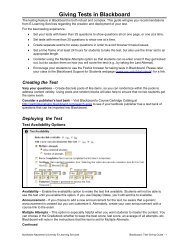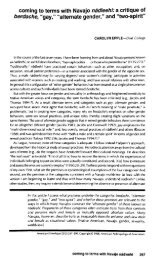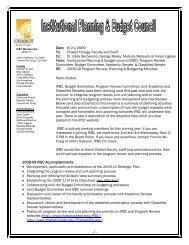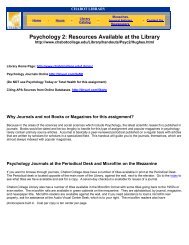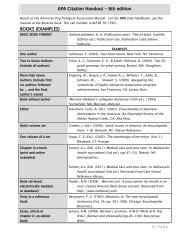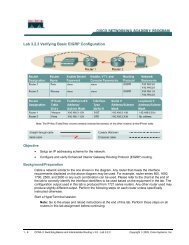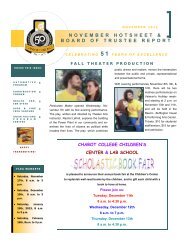BSI Self-Assessment Summary.rtf - Chabot College
BSI Self-Assessment Summary.rtf - Chabot College
BSI Self-Assessment Summary.rtf - Chabot College
You also want an ePaper? Increase the reach of your titles
YUMPU automatically turns print PDFs into web optimized ePapers that Google loves.
As noted above, developmental education at <strong>Chabot</strong> is de-centralized and has been minimally<br />
coordinated. Budgeting for developmental education is subsumed within larger division budgets. A<br />
movement toward greater coordination is evident in the integration of student tutorial services under the<br />
Learning Connection and the creation of a college-wide Basic Skills Committee. Formal and informal<br />
mechanisms exist for faculty within developmental disciplines to discuss instructional issues (Math’s<br />
long-standing Basic Skills faculty group, English “Talking about Teaching: English 102” series and<br />
ongoing workshops/retreats, ESL’s regular faculty workshops). Cross-disciplinary conversations about<br />
basic skills education have historically been limited to special programs (e.g.: learning communities),<br />
but have recently occurred more broadly among faculty involved in the Learning Connection, in Flex<br />
Day programs (e.g. college-wide viewing & discussion of video Reading Between the Lives), and<br />
among faculty participating in projects funded by Basic Skills Initiative or Carnegie grant. This is a<br />
promising trend for the Basic Skills Committee to build upon.<br />
A.4: Institutional policies facilitate student completion of necessary developmental<br />
coursework as early as possible in the educational sequence.<br />
<strong>Assessment</strong>, orientation, and placement are encouraged at <strong>Chabot</strong> through registration incentives, and<br />
students who see counselors are advised to take developmental coursework early. However, many<br />
students do not participate in these processes, and few pre-requisites block them from enrolling in<br />
transfer-level courses outside of English, Math. We do not have clear data on how many complete<br />
developmental coursework early and how many postpone these (often dreaded) classes. There is some<br />
disagreement among members of the Basic Skills Committee about the advisability of requiring<br />
students to pass a series of pre-requisites to gain entry to college-level courses. Institutional data on<br />
student performance is regularly monitored within divisions (e.g. English, Math, Counseling) and used<br />
for program planning and student advising.<br />
A.5: A comprehensive system of support services exists and is characterized by a high degree<br />
of integration among academic and student support services.<br />
This has been an area of significant focus and investment in the last few years, as separate support<br />
services (e.g. Math Lab, WRAC lab, Language Lab) have been integrated under the new college-wide<br />
Learning Connection, and support services have been developed in new disciplines. Services take<br />
many forms, (e.g.: individualized instruction from faculty, student-led supplemental instruction, peer<br />
learning assistants embedded in the classroom, subject-matter peer tutors, study groups). Faculty from<br />
the following disciplines currently serve as liaisons and/or tutor trainers: English, math, world<br />
languages, speech and communications, ESL, chemistry, life sciences. Student learning assistants<br />
provide support in classes in the following disciplines: business, CAS, art, anatomy, math, chemistry,<br />
English, ASL, Learning Skills, ECD, world languages. The Learning Connection plans to expand these<br />
offerings further through a “bottom up” approach in which instructors and staff across the curriculum<br />
identify learning needs, and the Learning Connection works with them to create and then to<br />
institutionalize successful pilots to address those needs. As the Learning Connection moves into its<br />
next phase of development, one area for attention involves gathering data to systematically assess its<br />
support services, then sharing those results with the broader college.<br />
A.6: Faculty who are both knowledgeable and enthusiastic about developmental education are<br />
recruited and hired to teach in the program.





